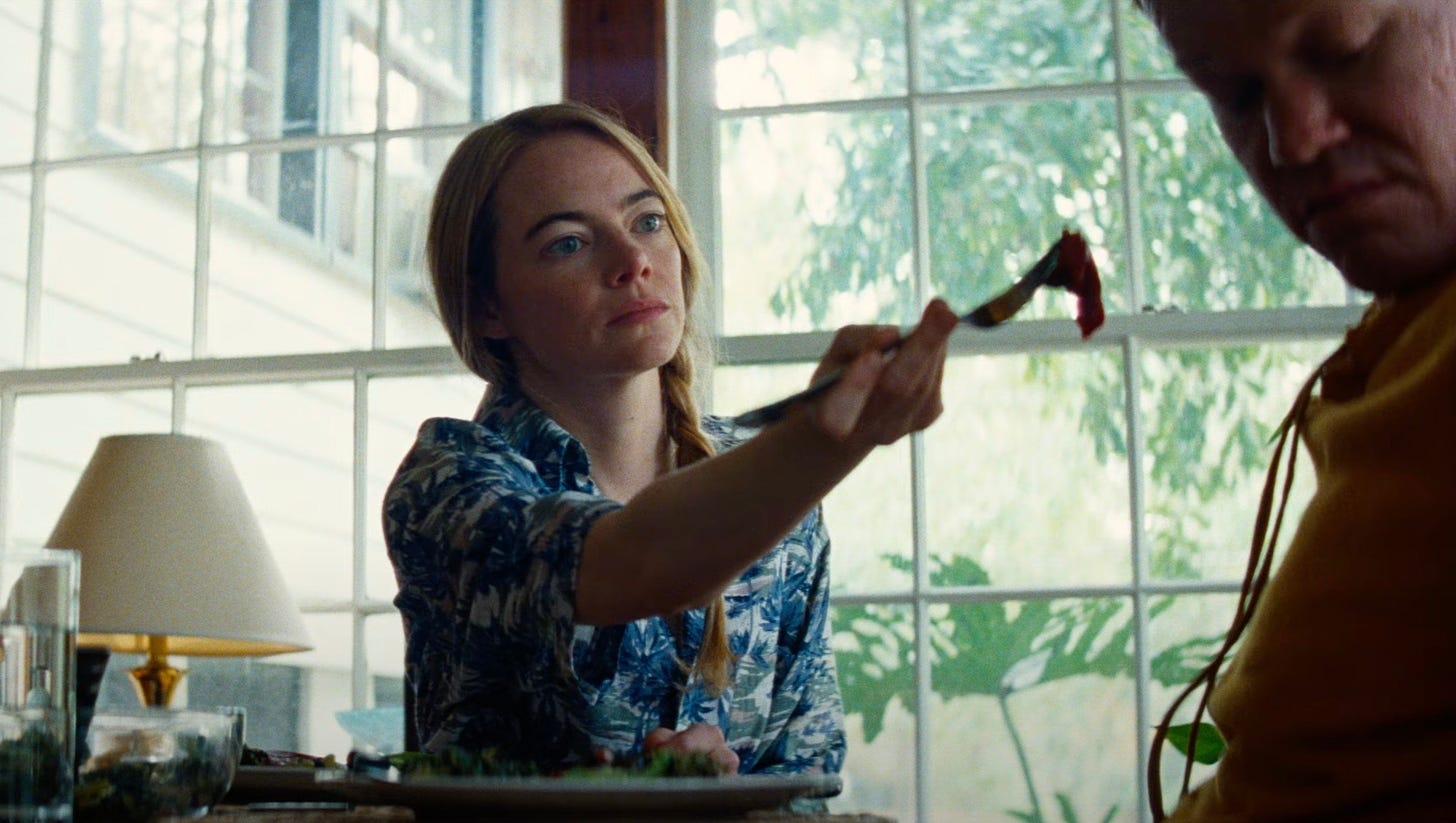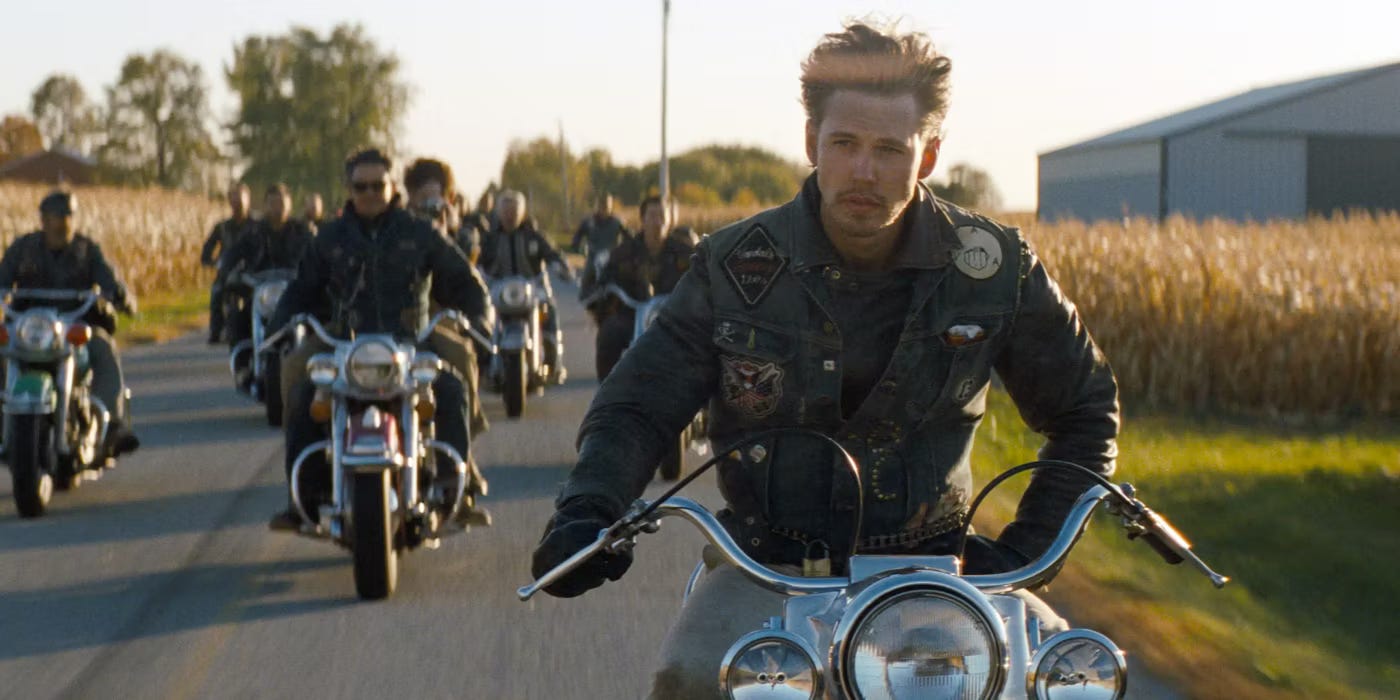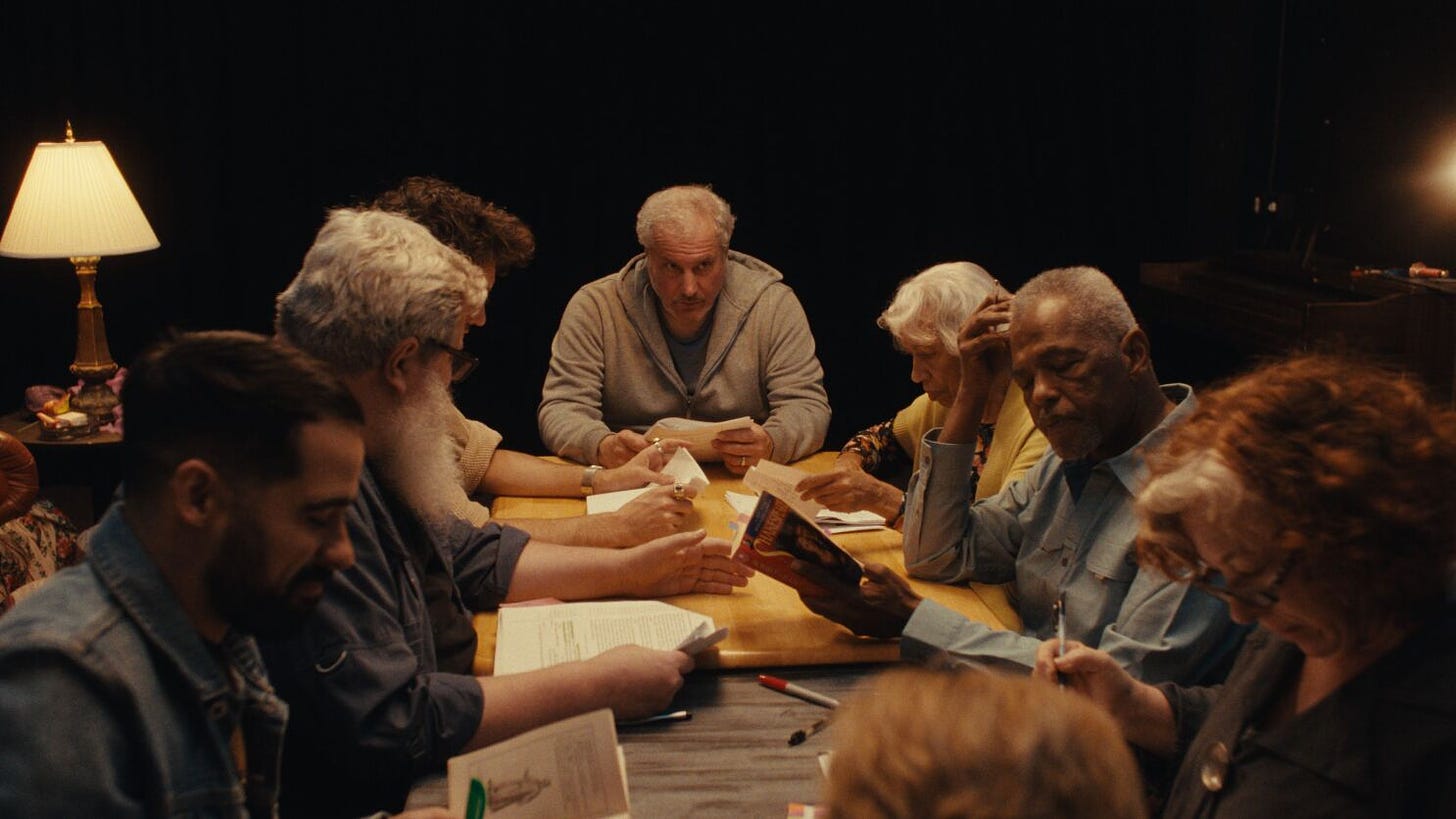In Review: 'Kinds of Kindness,' 'The Bikeriders,' 'Ghostlight'
A perfect time to duck into the air conditioning to see new movies by Yorgos Lanthimos and Jeff Nichols, plus a lower-key indie gem about on-stage and off-stage drama.
Kinds of Kindness
Dir. Yorgos Lanthimos
165 min.
It feels strange to think about Yorgos Lanthimos’ last two features, 2018’s The Favourite and last year’s Poor Things, as dramatic shifts toward the mainstream from a once defiantly outré director, given that one is a period piece rife with royal filth and perversion and the other details the sexual escapades of a revivified young woman with an infant’s brain. And yet, that’s what Lanthimos does so well: He sets his own context for the worlds he creates and the strange and sometimes shocking events that take place within them can be more palatable than you’d imagine. Kinds of Kindness, his most confrontational work since The Killing of a Sacred Deer and by far his longest film to date, doesn’t play nice, even by Lanthimos standards. Through a triptych of short stories—almost novellas, given their length—the film aims to rattle the cage, presenting human experience as the fruitless management of chaos through the institutions of work, marriage, and faith. In a Lanthimos comedy, the desire for control always invites its opposite.
Before we go any further, here’s a disclaimer that could apply to many movies and definitely applies to Lanthimos’ movies and especially applies to this Lanthimos movie: A first reaction is provisional, because the connections between these three different stories, all featuring the same seven or so actors in roles with no obvious common thread, are obscure and the themes are difficult to parse, whether they’re unique to each short or add up to something more than their parts. Kinds of Kindness is also less pleasurable than Poor Things and The Favourite, stocked with blunter ironies and nastier punchlines that recall Lanthimos’ more flagrantly off-putting efforts, like Dogtooth and Sacred Deer. Perhaps that’s owed to a reunion with his screenwriting partners on those films, Efthimis Filippou, or a freedom to parlay his last two hits into one-for-me provocation. Whatever the case, it’s not easy to pick the thorns out of Kinds of Kindness.
It doesn’t help that the three stories are of roughly descending quality, though the quality gap between them isn’t too conspicuous. Though Kinds of Kindness reunites Lanthimos and Emma Stone for a third straight project, the standout performer in most of the shorts is Jesse Plemons, whose unsettling, off-kilter presence, combined with a child-like vulnerability, makes him a natural for the director. In the first short, titled “The Death of R.M.F.,” Plemons stars as Robert, a man leading a cozy upper-middle-class life with his wife Sarah (Hong Chau), entirely due to the generosity of his boss/benefactor Raymond (Willem Dafoe), who controls his days down to the minute. When the boss asks him to hit a driver with his car, however, Robert balks at the request, betraying the conditional loyalty that binds Raymond to other people, too, like his wife (Qualley) and an optician (Stone). Then again, when Raymond sent him housewarming gifts like a smashed John McEnroe racket, he might have seen the destructive end coming.
The second and third stories each deal with death and rebirth, and the role faith plays in both scenarios. In the second, Plemons shifts from the mild-mannered, put-upon Robert to the more imposing Daniel, a policeman who doesn’t believe that the woman (Stone) who has returned home miraculously after going missing during a marine expedition is really his wife, despite appearances. And so he forces her to prove her authenticity through a series of macabre trials that he’s certain will reveal her to be an imposter. In the final chapter, Stone takes center stage as a cult devotee who’s on the hunt for a prophesied spiritual leader who can reanimate the dead.
As a stylist, Lanthimos has only gotten more assured over time and Kinds of Kindness discards the fisheye period distortion of The Favourite and Poor Things in favor of the crisp formalism of his other work, flavored with engaging pops of color. The visual uniformity of all three segments, combined with the actors reappearing in different roles, suggests an intended cohesion between the stories, but apart from the appearance of a bearded man initialed R.M.F., the themes and perspective of Kinds of Kindness are the only glue holding it together. The breakdown of an absurd yet ordered world has been a pet theme of Lanthimos since Dogtooth, but he’s also expressing an emotional neediness here that’s less familiar, though not as easy for him to locate. His satirical instincts have a way of flattening his characters into types and resolving their stories with an unsatisfying glibness. They may need love, but they’re not getting it from their creator. — Scott Tobias
Kinds of Kindness opens in limited release tomorrow.
The Bikeriders
Dir. Jeff Nichols
116 min.
“Whaddaya got?,” Marlon Brando, as leather-clad biker Johnny Strabler in The Wild One, famously replies when asked what he’s rebelling against. For some, that would prove to be answer enough. Inspired by photographer and filmmaker Danny Lyon’s non-fiction book of the same name, The Bikeriders depicts a fictionalized version of a few eventful years in the existence of Outlaws MC, a Chicago-area motorcycle club. In the film’s telling, Brando plays a central role in inspiring the creation of The Vandals, the film’s equivalent of the Outlaws. After the club’s soon-to-be-leader Johnny (Tom Hardy), a truck driver with a wife and children, catches The Wild One on TV one night it serves as a lightbulb, inspiring him to gather like-minded motorcycle enthusiasts for a club dedicated to unfocused rebellion. That mostly means riding fast, getting drunk and high, throwing a few punches, and starting all over again. Because why not? Whaddaya got?
Written and directed by Jeff Nichols, The Bikeriders takes a sideways route to understanding the Vandals and why they do what they do. The film's two central bikers, Johnny and the younger but no less dedicated Benny (Austin Butler), are so committed to their outlaw pose that they rarely allow any glimpses beneath the surface. Being a Vandal simplifies life, offering both a reason for being and a code of honor that must be followed. In the film’s opening scene, Benny wears his biker colors into a hostile bar. When he’s then forced to fight the toughs who object to his presence, he goes about the task with an almost weary resignation. That’s just the way it is. Bring it on.
Johnny and Benny offer two minor variations on biker cool. Johnny’s tough and removed, almost placid. Benny’s uncaring demeanor almost masks his hotblooded emotions. (Think Brando vs. Dean.) But it’s still mask enough that neither character, however charismatically played by Hardy and Butler, offers much insight into what, beyond the obvious, draws men to mount bikes. That task falls to Kathy (Jodi Comer), Benny’s wife, who both recounts and tries to explain the Vandals’ history in a series of interviews with the film’s version of Lyons (Mike Faist). Some are conducted at the club’s height, others after what could euphemistically be described as a period of transition.
“It took my breath away,” Kathy recalls of her first ride on Benny’s bike, after almost literally being swept off her feet. It’s easy to see why. If The Bikeriders isn’t as blindly enamored of biker life—its iconography, lingo, speed, and reckless abandon—as its talkative chronicler, Nichols, with a heavy assist from cinematographer Adam Stone, knows how to convey its grungy romance and oil-stained camaraderie. But Kathy is also grounded enough to understand you eventually have to start breathing again. Employing a melodic Chicago accent, Comer makes Kathy a verbose and adoring but often exasperated witness to The Vandals’ macho shenanigans, either never quite recognizing or refusing to acknowledge that they might be as empty at their core as the straight life they’re attempting to flee.
The choice to view the world through Kathy’s eyes pays off even when the story refuses to kick into high gear. Nichols is more interested in the milieu of the Vandals than what they do, perhaps because what they do keeps repeating itself week in and week out. That sometimes makes The Bikeriders frustrating, but the attention to detail makes even small changes feel significant. In time, those changes aren’t so small. The idea of what a biker is shifts beneath the original Vandals’ feet as the ‘60s turn into the ‘70s and hardened, desperate characters start to displace those out for a good time and the final stretch of the film recalls similar after-the-party’s-over stretches in Boogie Nights and Goodfellas. Maybe, in the end, Johnny’s vision was less a way of life than a dream that couldn’t last. —Keith Phipps
The Bikeriders zooms into theaters tonight.
Ghostlight
Dir. Kelly O’Sullivan, Alex Thompson
114 min.
Gazing at the dawn from his bedroom window, Dan (Keith Kupferer) looks like a man who knows quiet but not peace in the opening shot of Ghostlight, an intimate and moving new drama written by Kelly O’Sullivan and directed by O’Sullivan and Alex Thompson. What, exactly, is troubling Dan only becomes clear bit-by-bit. A construction worker who lives and works somewhere in Chicagoland’s North Shore, he’s called away from his job to deal with an incident in which his teenage daughter Daisy (Katherine May Kupferer) pushes a teacher (or, in Daisy’s words, is “alleged” to have pushed the teacher). It quickly becomes clear this behavior is not new. Nor is the tension between Daisy, Dan, and Dan’s wife Sharon (Tara Mallen) the sort created by one rebellious act, or the kind that disappears easily. Theirs is a family, as Daisy’s principal notes, already going through something. They appear unlikely to reach the other side of it soon.
Ghostlight withholds the details of the events they try never to talk about until late in the film, a device likely to serve as a red flag for veteran indie moviegoers who’ve seen it used too often. So, too, might the film’s plot. Dan’s the sort of man more likely to take his frustrations out on a speeding motorist buzzing his worksite than talk about his problems. After witnessing this outburst, Rita (Dolly DeLeon, who recently stole Triangle of Sadness), a professional actor now working with a community theater troupe after giving up Broadway to return to her hometown, brings Dan backstage. If he can read he can act and they need all the warm bodies they can find for a forthcoming production of Romeo and Juliet, particularly if he can bring some of that energy to the stage. That sounds like the set-up for a strand of British films that filled arthouses in late-’90s after the success of The Full Monty, in which salt-of-the-earth types get in touch with themselves and their creative impulses. Ignore those red flags and press on: this is the good stuff, a thoughtful, frequently funny, and beautifully acted film that plunges into the complexities of family, mourning, and what happens to the emotions we try, but never succeed, in keeping bottled up.
With Rita and her misfit band of amateur actors, Dan, slowly, finds himself opening up, often in ways that unnerve him. He’s forced to express himself in improv exercises and, as he immerses himself in the world of iambic pentameter, he starts seeing parallels between Shakespeare’s story and the tragedy at the center of his own family’s life. While Dan’s journey gives the film its spine, he’s hardly the sole focus. Brash and diminutive (the height difference between the burly elder Kupferer and DeLeon works as a running gag), Rita carries herself with professional weariness but projects an undimmed passion that suggests why she might find more satisfaction on the small stage than Broadway. Sharon and Daisy emerge as complex characters on journeys of their own. (The lived-in family dynamics might have something to do with Mallen and the two Kupferers being a family in real life. O’Sullivan and Thompson are also partners.)
Much of Ghostlight’s effectiveness comes from its sense of scale. The film never suggests its characters are creating anything beyond an earnest and (mostly) competent production. Though the film’s not without some big dramatic outbursts, O’Sullivan and Thompson mostly stack one small, meaningful moment on top of one another. The characters don’t experience breakthroughs that fix everything because some things can’t be fixed. And theater, even Shakespeare, offers no answers, only a greater sense of understanding that can be shared and remembered long after the lights come up and the audience leaves. —Keith Phipps
Ghostlight is currently playing select theaters.











Return to Dogtooth and Killing of a Sacred Deer now has me excited
The Bikeriders looks good, but both times I've seen the trailer in a theater people laughed when the title was revealed.